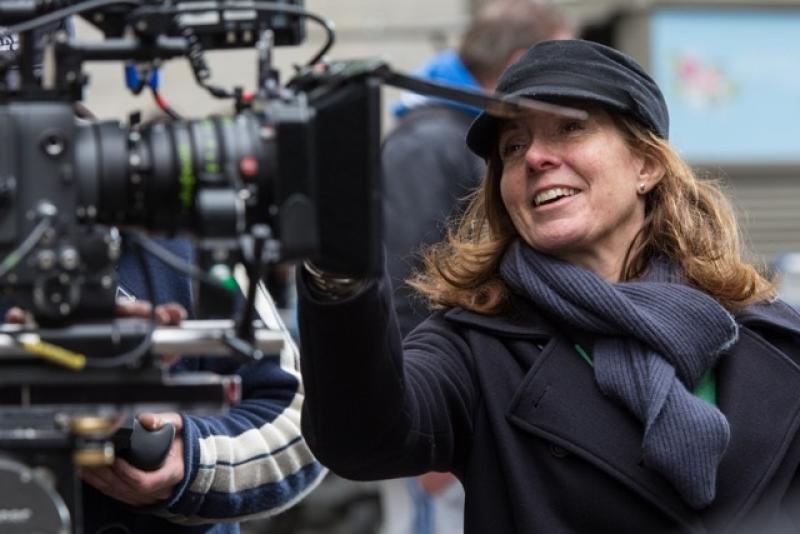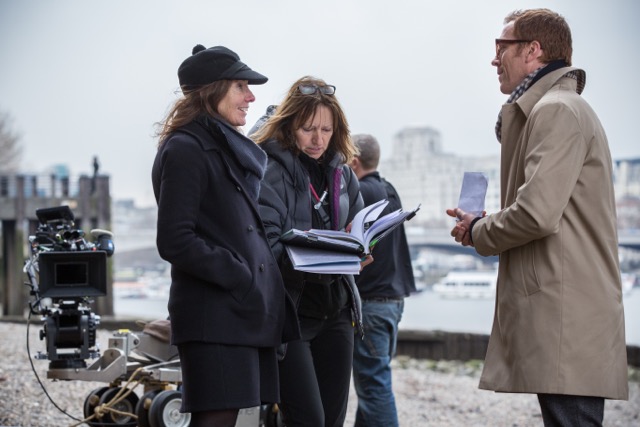First Person: 'I am one of only three percent' | reviews, news & interviews
First Person: 'I am one of only three percent'
First Person: 'I am one of only three percent'
Female film directors are an industry minority. With her second film out this week, Susanna White argues it's time for a change

Last week a report was published by Directors UK laying out the cold facts of a trend that a lot of us knew had been going on for a long time - if you are a man you are six times more likely to make a feature film than a woman. The needle hasn’t moved for the last 10 years.
What shocked industry insiders was the funnel effect on women’s careers. Unlike science and engineering which have had trouble attracting girls, 50 percent of the entry into film schools is female, and 49 percent of people entering the industry in vocational roles like runners or production assistants are women. What the study shows is that at each rung of the career ladder you are increasingly likely to be squeezed out if you are a woman. Only 27 percent of short films and 21 percent of publicly funded films were directed by women. As budgets rise fewer women were hired - 16 percent of low-budget films, 13 percent of mid-budget films and as little as three percent of big-budget films were directed by women. This filtering effect has resulted in the disappearance of women directors at every level as they try to progress their careers.
It took me till my late forties to direct my first feature film
For an industry that we think of as all about zeitgeist, it is actually very risk-averse. It’s a vicious circle: people tend to hire people with experience and that experience is hard to get if you are female. The freelance culture means that career development happens on a project by project basis, so unlike areas like the judiciary or the armed forces it has been very hard to monitor and adjust. For years I’ve had people telling me that the reason there weren’t more women was that it was a choice people made to stay home with their children. But that argument didn’t ever make sense to me when I went into work and saw the legions of women at the top of make-up, hair and costume where women were encouraged. They work longer hours than anyone and it didn’t put them off.
Despite being given a Fulbright Scholarship to study film at the University of California, Los Angeles, in the 1980s, it took me till I was in my late forties to get to direct my first feature film, despite having won a BAFTA for directing Bleak House and having numerous Emmy nominations. I used to think deep inside that maybe it was because I wasn’t actually that good. I now realise that I was actually part of a huge trend, and that is strangely reassuring.

When I did get that film it was a family film, Nanny McPhee and the Big Bang, a wonderful opportunity to make a huge studio film with big stars, but again, typical of another trend - that when women do get offered films there is often another type of subconscious gender bias. I’ve just made my second film, John Le Carré’s Our Kind of Traitor, which opens in cinemas this weekend, starring Ewan McGregor, Damian Lewis (pictured above with Susanna White) and Naomie Harris. In the genre of espionage thrillers, I am one of only three percent of female directors.
Every director makes a film according to their own sensibility, but there is certainly evidence that women tend to favour stronger roles for female actors and often have a different attitude to screen violence. We all know what a powerful influence on our society cinema is. The good news is that this study has had an impact beyond the film industry, with questions being asked this week in the House of Lords about what it says about the culture we live in. There are strong signs that people want to change that behaviour and the good news is there is a massive pool of talented women ready to take up the challenge when the tap is turned on.
Explore topics
Share this article
The future of Arts Journalism
You can stop theartsdesk.com closing!
We urgently need financing to survive. Our fundraising drive has thus far raised £49,000 but we need to reach £100,000 or we will be forced to close. Please contribute here: https://gofund.me/c3f6033d
And if you can forward this information to anyone who might assist, we’d be grateful.

Subscribe to theartsdesk.com
Thank you for continuing to read our work on theartsdesk.com. For unlimited access to every article in its entirety, including our archive of more than 15,000 pieces, we're asking for £5 per month or £40 per year. We feel it's a very good deal, and hope you do too.
To take a subscription now simply click here.
And if you're looking for that extra gift for a friend or family member, why not treat them to a theartsdesk.com gift subscription?
more Film
 Can I get a Witness? review - time to die before you get old
Ann Marie Fleming directs Sandra Oh in dystopian fantasy that fails to ignite
Can I get a Witness? review - time to die before you get old
Ann Marie Fleming directs Sandra Oh in dystopian fantasy that fails to ignite
 Happyend review - the kids are never alright
In this futuristic blackboard jungle everything is a bit too manicured
Happyend review - the kids are never alright
In this futuristic blackboard jungle everything is a bit too manicured
 Robert Redford (1936-2025)
The star was more admired within the screen trade than by the critics
Robert Redford (1936-2025)
The star was more admired within the screen trade than by the critics
 Blu-ray: The Sons of Great Bear
DEFA's first 'Red Western': a revisionist take on colonial expansion
Blu-ray: The Sons of Great Bear
DEFA's first 'Red Western': a revisionist take on colonial expansion
 Spinal Tap II: The End Continues review - comedy rock band fails to revive past glories
Belated satirical sequel runs out of gas
Spinal Tap II: The End Continues review - comedy rock band fails to revive past glories
Belated satirical sequel runs out of gas
 Downton Abbey: The Grand Finale review - an attemptedly elegiac final chapter haunted by its past
Noel Coward is a welcome visitor to the insular world of the hit series
Downton Abbey: The Grand Finale review - an attemptedly elegiac final chapter haunted by its past
Noel Coward is a welcome visitor to the insular world of the hit series
 Islands review - sunshine noir serves an ace
Sam Riley is the holiday resort tennis pro in over his head
Islands review - sunshine noir serves an ace
Sam Riley is the holiday resort tennis pro in over his head
 theartsdesk Q&A: actor Sam Riley on playing a washed-up loner in the thriller 'Islands'
The actor discusses his love of self-destructive characters and the problem with fame
theartsdesk Q&A: actor Sam Riley on playing a washed-up loner in the thriller 'Islands'
The actor discusses his love of self-destructive characters and the problem with fame
 Honey Don’t! review - film noir in the bright sun
A Coen brother with a blood-simple gumshoe caper
Honey Don’t! review - film noir in the bright sun
A Coen brother with a blood-simple gumshoe caper
 The Courageous review - Ophélia Kolb excels as a single mother on the edge
Jasmin Gordon's directorial debut features strong performances but leaves too much unexplained
The Courageous review - Ophélia Kolb excels as a single mother on the edge
Jasmin Gordon's directorial debut features strong performances but leaves too much unexplained
 Blu-ray: The Graduate
Post #MeToo, can Mike Nichols' second feature still lay claim to Classic Film status?
Blu-ray: The Graduate
Post #MeToo, can Mike Nichols' second feature still lay claim to Classic Film status?

Add comment